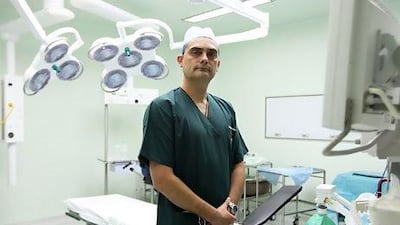ABU DHABI // The country's multinational population makes it easy for things to get lost in translation during medical consultations, and can make a trip to the doctor an unpleasant experience for patients.
The challenge of cross-culture communication is at the core of the problem, doctors say.
"Each culture has its own customs and you must be sensitive to those customs," said Dr Aqeel Mousa Abdulhadi, a family medicine specialist at Emirates Hospital. "Language is another challenge, medical terms can often be difficult and the diagnosis or treatment needs to be explained in a manner the patient can understand."
A successful doctor must understand the psychosocial aspect of their work, said Dr Dejan Stepic, a general surgeon at Medcare Hospital in Dubai.
"It's part of his responsibility as a physician," he said. "A good doctor knows how to find the balance between relaying information while being sensitive to the patient's background."
Patients say they are often frustrated with the lack of bedside manner and communication skills demonstrated by physicians, and that they often find themselves compromising comfort for knowledge.
NM was referred by a family friend to an Iraqi gynaecologist for her expertise. Every time the newlywed Palestinian went to an appointment, she would return in tears. "Instead of being informative, she would make judgemental and rude remarks about my personal life," she said.
NM visited a final time because she feared a miscarriage during the second month of her first pregnancy.
"She said she didn't understand why I was so concerned about losing this baby and said that if I did lose it, I'll just have another one," NM said. "It was a horrible experience. As a patient, you're already sitting there, half-dressed, feeling scared and you want someone to give you comfort - to inform you but also help you relax."
Others patients complain doctors are not receptive to questions during medical examinations.
Omaimah, an Egyptian woman with stage-three breast cancer, said her public hospital doctor was vague when she asked about her prognosis.
"He would just tell me he knew what he was doing and to hope for the best, and would resist answering any more questions," she said. "But he was highly recommended by others for his experience, so we didn't want to risk going to someone else."
More than 60 per cent of the 150 complaints accepted by the Dubai Health Authority (DHA) last year involved communication failure, either between health care professionals or between physicians and their patients.
"We deal with purely medical cases, but when we analysed those cases further, we found there was some kind of communication breakdown with patients and these cases did not always involve a medical error," said Dr Layla Al Marzouqui, head of clinical governance and health at the DHA. "Doctors should understand that many problems can be avoided once you build a positive relationship with patients based on trust and compassion, and the patient leaves their office feeling satisfied."
But cultural issues also affect the way patients respond to doctors' questions.
"Arab patients don't say anything because they're afraid they're going to be judged since they've been brought up being told that this is something wrong," said Dr Janeta Atanassova, a Bulgarian gynaecologist. "This makes it more difficult for us, because they may be withholding information that can help us with their diagnosis."
It is this fear of being judged that often causes patients to choose doctors by nationality, Dr Atanassova said. Another consideration is gender.
Ministry of Health regulations require an assistant be present in the room when a doctor of the opposite sex is physically examining a patient, but some patients demand that family members be present as well.
"One time a patient's husband wanted to be present while I examined her, and another time a patient's son wanted to be in the room while I examined his mother," said Dr Imad Nakad, a Syrian-American specialist in internal medicine. "These are cultural factors we need to be prepared for."
Asking questions about matters considered culturally sensitive or personal can be problematic.
"Some people don't understand why you're asking them about their family history and other private questions, such as their marital status or whether or not they drink alcohol, but when you go back and explain why, they understand," Dr Nakad said.
In some cultures, families are overprotective of patients.
It is common for Emirati families of cancer patients to demand that the patient not be informed of the diagnosis, a request that Dr Mohammed Jaloudi, chairman of the oncology department at Tawam Hospital, said he would like to see made less often.
"They do this thinking that they are protecting the patient," he said. "Sometimes we have to respect the wishes of the family not to create problems." But patients have a "legal, moral and ethical right to know about their disease and whether it's fatal or curable", he added.
Health authorities and medical schools are taking action to improve the communication skills of health care professionals.
The DHA offers voluntary workshops at Rashid Hospital for doctors in the private and public sectors.
However, those who are deemed by the DHA to have communication issues are given three months to go on a corrective course and provide proof of attendance.
At the Ministry of Health, skills on human interaction are part of the 30 hours of continuing medical education that doctors must fulfil annually. Doctors are also assessed on communication skills during an oral examination when applying for their licences.
"This is of the utmost importance," Dr Sulaiman said. "You can be an expert in your field, but it's nothing if you don't know how to use this knowledge in a professional manner."

